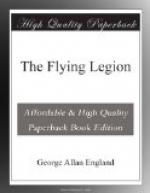“Yes, and may Jehannum take them all!” exclaimed the Frenchman, passionately. His eyes glowered with hate as he peered across the narrowing strip of waves and surf. “Jehannum, where every time their skins are burned off, as the Koran says, new ones will grow to be burned off again! Where ’they shall have garments of fire fitted upon them and boiling water poured upon their heads, and they shall be beaten with maces of iron—”
“And their tormentors shall say unto them: ’Taste ye the pain of burning!’” the Master concluded the familiar quotation with a smile. “Waste no time in wishing the Beni Harb future pain, my dear Lieutenant. Jehannum may indeed reserve the fruit of the tree Al Zakkum, for these dogs, but our work is to give them a foretaste of it, today. Kismet seems to have willed it that you and the Beni Harb shall meet again. Is it not a fortunate circumstance, for you?”
“Fortunate, yes,” the Frenchman answered, his eyes glowing as they estimated the strength of the war-party, now densely massed along the shining sands, “But, thank God, there are no women in this party! That would mean that one of us would have to kill a woman—for God help a woman of Feringistan caught by these jinnee, these devils of the waste!”
Silence again. Both men studied the Beni Harb. The Frenchman judged, reverting to his native tongue: “Certainly more than three hundred of these ‘abusers of the salt,’ my Captain. And we are hardly thirty. Even if we reach land, we must soon sink to earth. Without food, water, anything—ce n’est pas gai, hein?”
“No, it is not gay,” the chief answered. “But with machine-guns—”
“Machine-guns cannot fight against the African sun, against famine, thirst, delirium, madness. Well—’blessed be certainty,’ as the Arabs say.”
“You mean death?”
“Yes, I mean death. We always have that in our grasp, at any rate—after having taken full toll of these devils. I should not mind, so much, defeat at the hands of the nobler breed of the Arabian Peninsula. There, in the Ruba el Khali[1] itself, I know a chivalric race dwells that any soldier might be proud to fight or to rule over. But these Shiah heretic swine—ah, see now, they are taking cover already? They will not stand and fight, like men!”
[Footnote 1: Ruba el Khali (The Empty Abodes), a name applied by the Arabs to the Peninsula, especially the vast inner region never penetrated by any white man.]
Scornfully he flung a hand at the Beni Harb. The fringes of the tribe were trickling up the sands, backward, away, toward the line of purple-hazed dunes that lined the coast. More and more of the war-party followed. Gradually all passed up the wady, over the dunes and vanished.
“They are going to ambush us, my Captain,” said Leclair. “’In rice, strength; in the Beni Harb, manhood!’”
Nearer the land, ever sagging down but still afloat—though now at times some of the heavier surges broke in foam over the rail of the lower gallery—the Eagle of the Sky drifted on, on. Hardly a half-mile now lay between air-liner and shore. Suddenly the Master began to speak:




